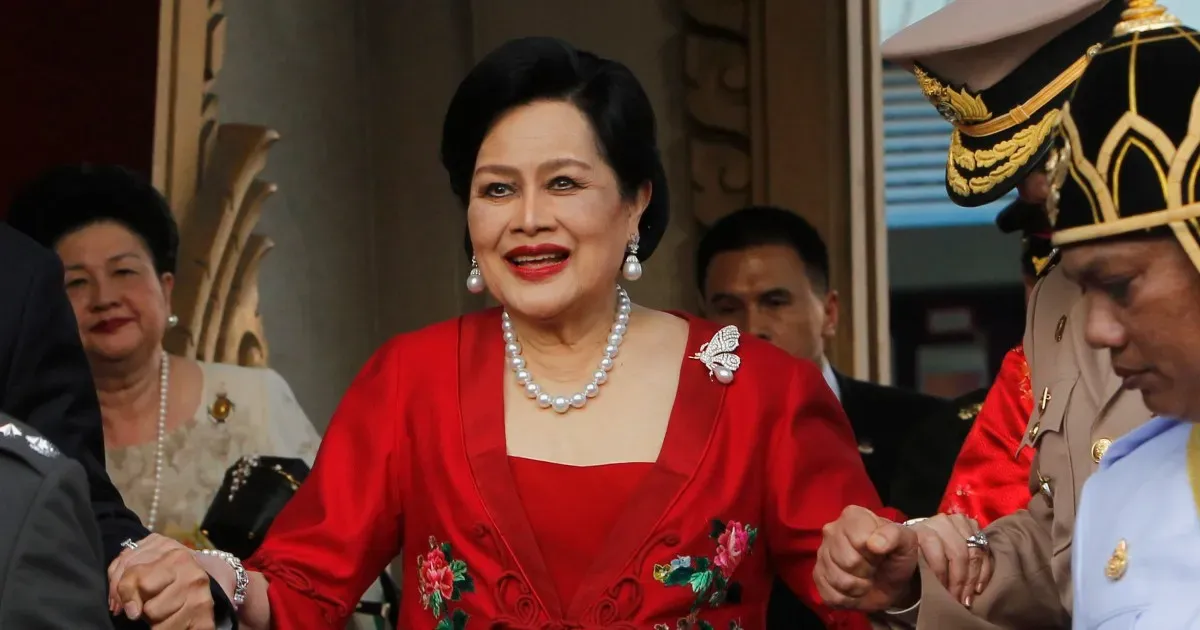Thailand Mourns the Passing of Queen Sirikit at 93 — The Nation’s Beloved Mother and Last Link to a Royal Era

Title: Thailand Mourns the Passing of Queen Sirikit at 93 — The Nation’s Beloved Mother and Last Link to a Royal Era
A Nation in Mourning
Thailand is mourning the loss of Queen Sirikit, the mother of King Vajiralongkorn, who passed away peacefully in Bangkok at the age of 93. The Royal Household Bureau confirmed that she died at 21:21 local time on Friday after battling several health issues since 2019, including a recent blood infection.
Queen Sirikit, widow of the late King Bhumibol Adulyadej, was one of the most admired and influential figures in modern Thai history. Her death marks the end of an era deeply intertwined with the country’s monarchy, culture, and people.
The Royal Funeral Arrangements
According to the Thai Royal Household Bureau, King Vajiralongkorn has ordered a royal funeral to honor his mother’s legacy. Queen Sirikit’s body will lie in state at Dusit Thorne Hall in Bangkok’s Grand Palace, where the public will be able to pay their respects. Members of the royal family will observe a year of mourning, a traditional gesture reflecting her importance in Thai society.
A Life of Grace, Duty, and Devotion
Queen Sirikit was born on 12 August 1932 in Bangkok. She became queen in 1950 after marrying King Bhumibol Adulyadej, who later became Thailand’s longest-reigning monarch. Their marriage, which lasted more than six decades until his passing in 2016, was one of Thailand’s most enduring royal partnerships.
The couple met in Paris while Sirikit was studying music, where her father served as the Thai ambassador to France. In a 1980 BBC interview, she recalled their first meeting with humor, saying it was “hate at first sight” because the young Bhumibol had arrived hours late, leaving her waiting while she practiced her curtsy. Despite the awkward start, their relationship blossomed into a royal love story that captivated the nation.
Thailand’s Fashion Icon and Global Ambassador
As a young queen, Sirikit quickly became known for her elegance and impeccable sense of style. In the 1950s and 1960s, she appeared on numerous international best-dressed lists and helped redefine Thai fashion by blending Western sophistication with traditional Thai grace.
During the early years of their reign, Queen Sirikit and King Bhumibol embarked on global tours, meeting world leaders such as U.S. President Dwight Eisenhower, Queen Elizabeth II, and even Elvis Presley. These visits introduced Thailand’s royal couple to the world and strengthened the country’s international ties during a time of great political change in Asia.
The “Mother of the Nation”
Queen Sirikit was deeply loved by the Thai people for her compassion, charitable work, and maternal image. Her birthday, August 12, has been celebrated as Mother’s Day in Thailand since 1976 — a testament to her symbolic role as the mother of the nation.
In her 1980 interview, she described the monarchy’s unique connection with the people, saying that Thai kings and queens are seen as the “father and mother of the nation.” This sense of duty, she said, left little room for private life, as their lives were dedicated to serving the people.
Throughout her lifetime, Queen Sirikit supported numerous social and cultural initiatives, from promoting Thai silk and traditional crafts to founding foundations for rural development, healthcare, and education. Her work brought prosperity to communities across Thailand and strengthened the bond between the monarchy and the public.
Years of Illness and Quiet Reflection
Queen Sirikit suffered a stroke in 2012, which led to her gradual withdrawal from public life. Although rarely seen in recent years, she remained a deeply respected figure and a symbol of continuity and stability for the Thai people.
In 2008, she made a rare public appearance at the funeral of an anti-government protester who was killed during violent clashes in Bangkok, a gesture that underscored her empathy and concern for her people.
Her health had been fragile in recent years, with multiple hospitalizations. Despite her declining condition, she remained a revered figure whose presence continued to shape the moral and emotional core of the Thai monarchy.
Legacy of Love and Loyalty
Queen Sirikit’s passing marks the end of a royal era that bridged tradition and modernity. Alongside King Bhumibol, she helped guide Thailand through periods of change and uncertainty, becoming an enduring symbol of unity, grace, and maternal strength.
She is survived by her son, King Vajiralongkorn, and three daughters — Princess Ubolratana, Princess Maha Chakri Sirindhorn, and Princess Chulabhorn.
Her life, marked by devotion to her country and her people, leaves behind a legacy that will continue to shape Thailand’s royal institution and national identity for generations to come.
As the nation enters a year of mourning, Thailand remembers Queen Sirikit not only as a queen consort but as the heart of a royal era — a beloved mother whose grace, compassion, and commitment defined an age of deep connection between the monarchy and the people.
